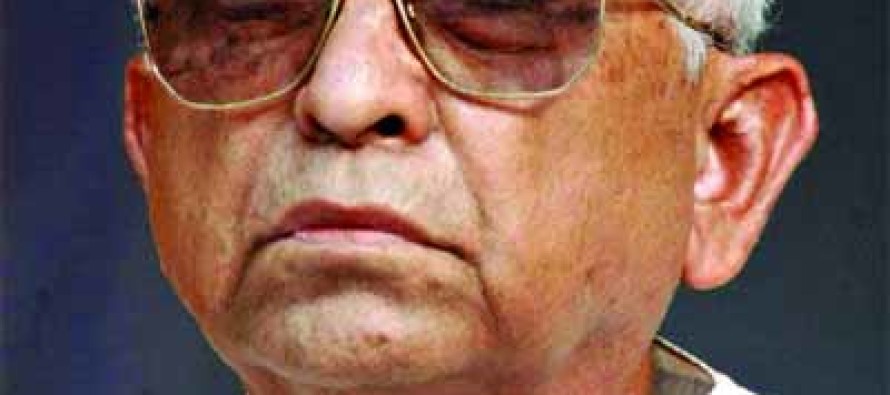In memory of a friend by Fazle Rashid

Saif Uddin Ahmed Manik (Mainka to his close friends of whom I can claim to be one) is dead. Death is inevitable. The inexorable march goes on, it does not discriminate. I had a hunch that there is something seriously wrong with Manik, a man of inexhaustible energy. My hunch deepened. He was no where to be seen during the recent turbulent days preceding the now famous 1/11 which was something unusual for a committed man like Manik. I knew that he had heart ailment but I did not know that he had been inflicted with the dreadful disease cancer.
The political career he pursued was not of his choice. He was a highly successful political leader through becoming president of the Communist Party of Bangladesh. He was a brilliant student and was set to choose a career in civil service. The Providence thought otherwise. He passed matriculation examinations from the Muslim Government High School in first division with distinction in geography in 1954 – a rare feat in those days when only about 35,000 boys and girls took the examinations under one single board.
He got himself admitted to Dhaka College. He came out with flying colours in the test examinations in 1956. Then came a major twist in his life. There was a thatched tea shop near the Ittefaq office. It was run by an old lady and we used to call her ‘Dadi’. Both Manik and I frequented the tea shop. I lived at KM Das Lane, Manik at Ram Krishna Mission Road, and the late Mainur Reza Chowdhury who later became the chief justice of Bangladesh lived at Gopibagh first or second lane. Manik was challenged by another friend of ours (Helal perhaps; I cannot recall his name) if he could consume a dozen of singara that were placed on a silver tray at Dadi’s tea shop he would be given Tk 10, a lot of money in those days. He accepted the bet and paid heavy price. The next day he was down with severe diarrhoea and failed to appear in the intermediate examinations.
His educational career thus became erratic and he was drawn to politics. His joining the politics also had a large slice of fortune. He joined Dhaka University taking a course in commerce. It was here that he became actively involved in politics. It was the grooming ground. Manik, Menon and Matia became a troika whose influence not only embraced and left a lasting mark on the left politics in the then East Pakistan but the embers were also to be felt in the Western wing of what was then Pakistan.
Manik joining the mainstream politics was more of an accident than a choice. It all started with Rabindranath Tagore’s birth centenary celebrations. Three of us – Manik, Abdul Jalil and I – got involved with the preparation of the Tagore centenary under the guidance of the late Wahidul Huq (Wahid bhai). Later, I became a junior colleague of Wahid bhai at the Morning News and subsequently at the New Nation.
Manik’s contribution to sports was enormous. He was a good cricket and football player. He came from a family whose association with sports was deep-rooted. His elder brother Salauddin was a keen sports organiser, his immediate younger brother Serajuddin Ahmed (Moni) was a cricket player and played against us and Selim another brother captained the Bangladesh football team.
It was in 1956 perhaps (I may be wrong about the year) that the first division cricket league got underway under the EPSF. Manik, Mizanur Rahman (Chana) and I decided that Brothers Union should join the cricket league. ABM Musa (Musa bhai) also encouraged us. The entry fee was Rs 45. We could manage Rs 35, leaving us short of Rs 10. I had a carom board. I sold it for Rs 15 and paid the entry fee. Thus began the onward march of Brothers Union as a cricket and later a football outfit.
It is a matter of great pride that Brothers Union later split into three similarly strong cricket teams. These were Eaglets Cricket Club, Azad Boys Club and Brothers Union.
Manik was also famous for clapping. In our days in the university the projection meetings to introduce candidates were major events. Manik had a peculiar way of clapping that reverberated throughout the SM Hall.
It was at Gopibagh behind the Rose Garden on a ground we practised every day. The late Mainur Reza Chowdhury, who was a good cricket player, joined us. He, if I remember correctly, also played cricket for Brothers Union.
Manik and I used to go to the Nawabpur level crossing almost every day in the late 1950s. We used to buy the Statesman and then go to Capital, a restaurant that was famous for both its Mughlai paratha and tea. Manik always footed the bill. Manik’s father, a venerable soft-spoken man, ran a ration shop at Thatari Bazar. Manik used to visit the shop to take some coins from the shop to pay for the Statesman, tea and Mughlai paratha.
Manik’s death followed a two-year battle with cancer. He had a buoyant personality. He had a disarming humour and won the admiration of all. The last time I met him was in the tent of Brothers Union two years ago. Mizanur Rahman (Chana) had arranged a reunion of sort of the old guards of the club. After a sumptuous lunch we all reminisced. Present were Manik, Chana, Musa bhai, Bazlur Rahman (Bazlu), Raisuddin Ahmed (Rais) and myself. Lutfar Rahman (Makhan Bhai) could not attend. I was presented with a chest pin of Brothers Union.
May Allah in His infinite mercy grant Manik His choicest blessings. Ameen.


